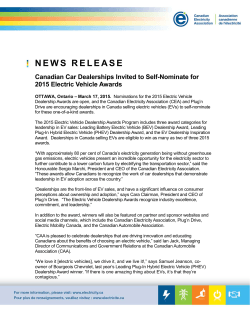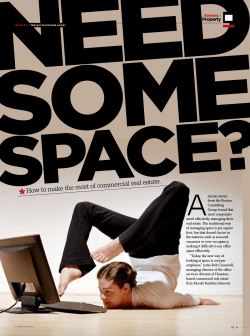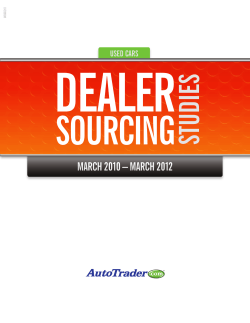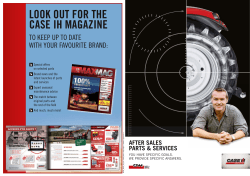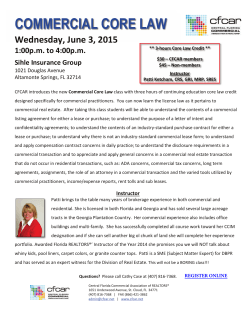
Slides - DrivingSales Presidents Club
April 1st, 2015
Grand Hyatt New York, NYC
~ Your Capital ~ Your People ~
~ Your Brand ~
Operating a Successful &
Compliant Retail Automotive
Dealership in 2015
Presented by
Jeffery G. Roberts
OPERATING A
SUCCESSFUL & COMPLIANT
RETAIL AUTOMOTIVE
DEALERSHIP IN 2015
JEFFERY G. ROBERTS
AGENDA
I.
Regulatory Compliance
II. Transactional Analysis
III. Essential Employment Law
IV. Tax and Estate Concepts
V.
Tesla and its Unique Situation
ROAD TO COMPLIANCE
Regulatory Compliance
LAWS, RULES, and REGULATIONS
•
•
•
•
•
•
•
FEDERAL LAWS
FEDERAL REGULATIONS
STATE LAWS
STATE REGULATIONS
CASE LAW RIGHTS
LOCAL LAWS
LOCAL REGUATIONS
Regulatory Compliance
ALPHABET SOUP
FCRA
FAA
UDTPA
CLA
GLB
TILA
OFAC
ECOA
FACTA
Policy & Procedure Manual
• The next big thing being pushed and sold
• Just add water approach to compliance
• More harm than good if not careful
• A good one is just long enough to cover the essentials
but short enough to keep things interesting
The Deal Process
SUMMARY OF PURPOSE OF COMPLIANCE DOCUMENTS
1. Credit Application – As provided by captive lender or otherwise.
2. Fair Credit Reporting Act Form ("Bank List") – The Bank List needs to be updated as new banks are added. This form should be
presented by the sales and leasing associate, along with the credit application. A copy should be filed in the permanent deal file.
3. Privacy Policy – This policy sets forth the dealership’s policies, rights and responsibilities with regard to personal financial
information provided by customers and potential customers.
4. Red Flags Rules – A notebook of these rules and regulations are kept in the F & I Directors office and in the Controller’s office. It
is your responsibility to know and implement the policies as set forth in this notebook.
5. Credit Score Disclosure Form – A dealership must provide to a consumer customer a Credit Score Disclosure Notice in order to
comply with the Risk Based Pricing Rule.
6. Borrowed Car Agreement – This agreement should be signed by anyone taking a car alone on a test drive. It not only ensures that
the sales professional obtains all required information from the potential customer but many insurance providers will require such a
form.
The Deal Process (cont.)
7. Worksheet – Each dealership has created its own internal worksheet. Please make sure this document ends up in the permanent
deal file unsigned.
8. Deal Verification Form – The Sales Manager for the deal should fill out the write-back sheet before the deal is sent to the F&I
office. This gives the dealership a great chance to catch any mistakes and provides a great defense to charges that F&I fraudulently
changed a deal.
9. Used Vehicle Appraisal Form – This document should be used by the manager that appraises any trade-in. It is important that it
is filled out completely and that it is signed by both the customer and the manager who appraised the vehicle.
10. Pay Off Verification – This form should be completed by the sales professional at the time the used vehicle is being appraised,
and always prior to the consummation of the deal. Sales made in the evening and on Saturday and Sunday prohibit the proper use of
this form; however, it is a best practice to have the customer complete and sign the form, in case there is a later discrepancy.
11. We Owe Sheet – The purpose of this document is to verify what, if anything, the dealership owes to a customer after the
consummation of a purchase or lease. If there is any consideration due to the customer from the dealership it should be noted on this
sheet. If not, then “Nothing Due or Promised” should be written on the sheet. Both the customer and the dealership should sign this
document.
The Deal Process (cont.)
12. Pre-Owned Vehicle Disclosure Form – This form is used in the sale of a used vehicle to further make disclosures and inform a
consumer purchaser regarding the condition of the vehicle. It is a great practice to also have a Carfax signed by the customer in
conjunction with this form
13. Purchase Order – Most important document as it sets forth the terms and conditions of each sale made to a customer. Dealership
management should be conversant with the contents of this document and it is imperative that both the customer and the dealership
execute this document. While there are many acceptable versions of this document the fact remains that it is the dealership’s primary
defense against customer claims and should be carefully completed and executed. A best practice is to use a LAW approved state
form available through specific vendors.
14. Lease Proposal – Same situation as Purchase Order except it is used for lease transactions.
15. Mutual Agreement to Arbitrate Claims – Alternative dispute resolution form that forces a claimant who will not be reasonable at
the settlement table to arbitrate their claim with an independent arbitrator as opposed to trying to hit a home run with a jury.
16. Checklist – I recommend that a checklist be used in every deal to ensure that each form is completed properly for each
transaction. That checklist should be signed by the F & I Manager and by an office “back stop”. There is no worse feeling than to be
sued, and discover that the paperwork you worked so hard to implement was not used or signed, and therefore, useless.
Deal Checklist Example
Date________________________
Name_______________________
Deal#_______________________
F&I MGR
Initials
All Deals
1. Signed Buyers Order / Lease Proposal Both Customer & Managers
2. Money Receipts ( copy of checks, money order & credit cards)
3. Copy of Drivers License
4. Rebate Form with Program Number
5. Credit Application - Signed by Customer
6. OFAC Report
7. Privacy Notice - Signed by Customer
8. Odometer Statements - Signed by Customer & Manager
9. FCRA Bank Form
10. Arbitration Agreement in All Deals Signed by Customer & Manager
11. Adverse Action Notice if no purchase
12. Worksheet
13. Used Car Buyers Guide
14. We Owe
Billing Clerk
Deal Checklist Example
Finance & Lease Contracts
1. Signed Contract - Lease Agreement
2. Bank or Lease Approval
3. Lease Worksheet
4. Proof of Insurance
5. Copy of Invoice
6. Copy of Book sheet (Preowned)
7. Co-Signer form Signed
8. Corporate Resolution / Guarantor Obligation (if applicable)
Taxation & Licensing
1. Must Collect Sales Tax For - AZ, CA, FL, HI, IN, MA, MI, SC, VT No 3rd Party Tax Credits
2. State Licensing Forms signed by customer
3. State tax forms
Customer Must be Eligible & Documentation in deal (for Illinois Residents only)
MENU
1. All Deals Including Cash Must Have A MENU Signed by Customer
2. Any Product Sold Must Have Corresponding Contracts/Documentation
Deal Checklist Example
TRADE-INS
1. Appraisal Sheet in Deal
2. Trade Odometer Signed by Customer & Managers
3. Title Papers Signed by Owner's or CVR Inquiry For True Ownership
4. Power of Attorney Signed by Customer (If no Title is in the Deal Credit Card Authorization)
5. Pay Off Sheet Signed by Customer or Payoff from Bank
6. Car Fax
RECAP
1. RECAP in Every Deal
CASH REPORTING
1. DOES THIS TRANSACTION REQUIRE A 8300 FORM? Yes______ No______
Finance Manager's Signature___________________________________
Billing Clerk Signature
_____________________
Additional Fees and Profits
• Documentary Fees
• Shop Related Fees
• F & I Caps on Rate
• Limit on Mark-up of Products
What Composes the
Value of a Dealership?
Box of Assets
• Sales & Service Agreement
• Data
• Employees
• Intellectual Property
• Inventory
• Fixed Assets
Factors to Valuation
• Multiple of Earnings too simplistic and “old
news.” (But one of many factors.)
• Regional Location and Variation
• Dealer Density
• How well run is the store
• Ratio of fixed gross to variable gross
Brokers
• Can add value
• Incredibly expensive (3-6%)
• Everyone knows the buyers and a good advisor (attorney or
accountant) who works in this field can independently
analyze an offer
• Good advisor can set up process for sale
• Fact driven scenario with brokers
Before You Buy or Sell
• If selling, meet with tax/estate advisors before you take
moves to market your business.
• If buying, meet with tax/estate advisors before structuring
your acquisition entities.
• Do you see a common theme here?
Big Picture Tax and Estate
ESTATE
• “Carve” out assets from dealership and estate
• Communicate desire and intent with heirs and other
stakeholders
• Succession planning essential
• Start early and give consistently
"Big business never pays a nickel in taxes, according
to Ralph Nader, who represents a big consumer
organization that never pays a nickel in taxes." –Dave Barry
INCOME
• Take advantage of cost-segregation opportunities
• Review new repair regs to ensure you are taking advantage of
new depreciation and expensing opportunities
• Deferral vs. avoidance “a tax delayed is an investment made”
Employment
1. NLRB OGC JOINT EMPLOYER SHOCKER
Traditional Analysis
v Hire and fire employees
v Supervise employees’ work schedule and conditions
v Determine rate and method of compensation
v Maintain employment records
Why does it matter?
Employment
2. EMPLOYEE/INDEPENDENT CONTRACTOR
• Traditionally an employment tax issue
• ACA has raised the stakes substantially
• Traditional 20 Factor analysis now 11
•
•
•
•
•
Instructions the business gives the worker
Training the business gives the worker
Extent to which unreimbursed business expenses
Extent of worker’s investment
Are worker’s service available to others
Employment
• Can worker realize profit or loss
• Is there a written contract between parties
• Are fringe benefits provided
• Permanency of relationship
• Are worker’s contributions main aspect of company’s business
WHY DOES IT MATTER?
Headline in Forbes “IRS Inspector Urges Crackdown on
Mislabeling ‘Independent Contractors’”
Tesla Monoluge
Take Aways
1.
Take Aways
2.
Take Aways
3.
"Anyone may arrange his affairs so that his
taxes shall be as low as possible; he is not
bound to choose that pattern which best pays
the treasury. There is not even a patriotic duty
to increase one's taxes. Over and over again
the courts have said that there is nothing
sinister in so arranging affairs as to keep taxes
as low as possible. Everyone does it, rich and
poor alike and all do right, for nobody owes
any public duty to pay more than the law
demands."
–Judge Learned Hand
Take Aways
4.
Take Aways
5.
Thank You!
April 1st, 2015
Grand Hyatt New York, NYC
Jeffery G. Roberts
~ Your Capital ~ Your People ~
~ Your Brand ~
© Copyright 2025




